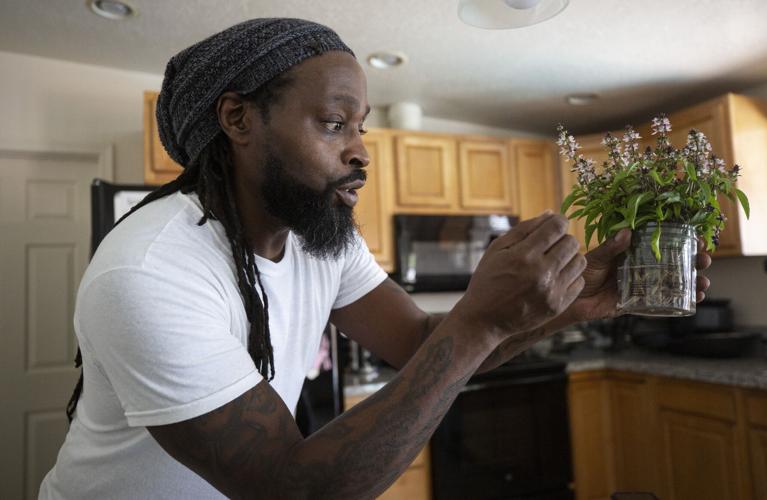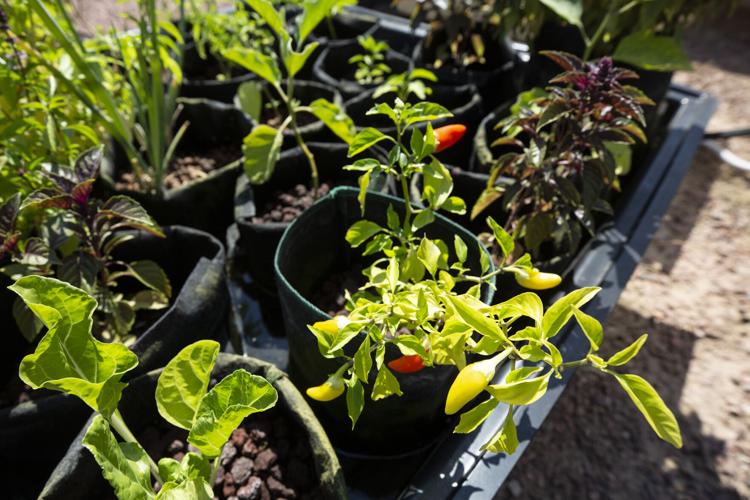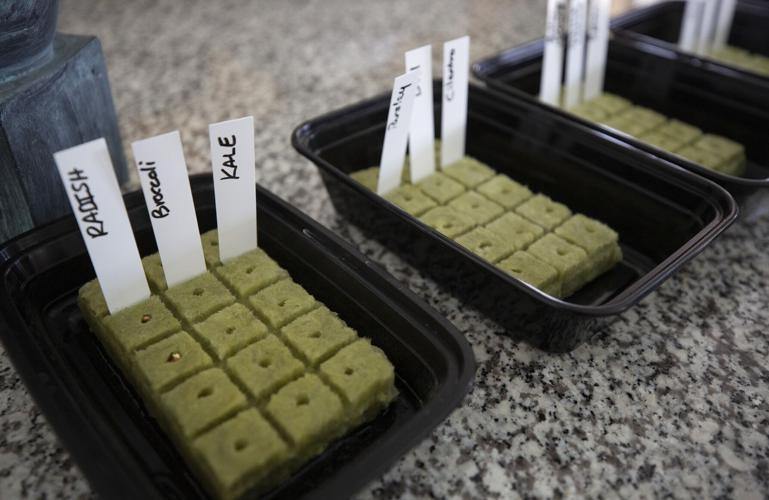Tucson's 2022 summer temperatures peaked at 111 degrees on June 16, but the scorching heat didn't faze Charles Collins' backyard vegetable garden.
That's because it was only 77 degrees inside the hydroponic garden, thanks to an underground water reservoir and a solar-powered chiller and pump.
Collins, an astronomer by trade, has spent years developing and perfecting hydroponic and aquaponic gardening systems, which he says are a solution to address climate change.
Hydroponics involves growing plants without using soil, and aquaponics is the growth of fish and plants together. Aquaponics is considered to be a sustainable agriculture process because it combines the production of plants and fish and makes the most efficient use of nonrenewable resources, including water.
Aquaponics and hydroponics can use up to 90% less water than traditional soil-growing methods. They can also be set up anywhere, including warehouses or old strip malls, and can be built up vertically, unlike soil-based gardens.
Collins and his work are gaining recognition in Tucson and beyond. A 2021 YouTube video about his work has racked up 7.8 million views and earned the attention of NASA. It also led to Collins connecting with representatives from the World Health Organization, the U.S. Environmental Protection Agency and the U.S. Department of Agriculture.
A full-length documentary about his work is in the editing stage of production, and he has just signed a contract with The Brick TV to create a streaming series highlighting his efforts.
But despite an already busy schedule, Collins always finds the time to pass along tips and educate gardeners in Tucson, through his nonprofit, Together We Grow, a robust YouTube channel and frequent posts in the popular Tucson Backyard Gardening group on Facebook.
He's hoping his many endeavors will help his research reach new audiences. And with a newly designed product system soon available for sale, Collins is working to make hydroponics more accessible than ever.
Recognition and impact
Collins' research may have originated in Tucson, but it has garnered worldwide recognition. In June 2021, he announced a partnership with the WHO in the development and implementation of real world applications to combat hunger, enhance health and deal with water shortages.
Earlier this year, Collins' research was added to the curriculum at Vrije Universiteit Amsterdam, a public research university in the Netherlands. This summer, his use of hydroponic and aquaponic growing systems was detailed in the WHO's 2022 South Africa National report.
His research has been certified by the WHO, validated by the EPA through controlled studies and implementation, and duplicated in labs and backyards around the world. Governments, including the United States,' are putting his work to use.
"Our research has changed how the government recommends that everyone gardens from now on," Collins said.
He added that NASA's Artemis mission "is taking our advice on how to continue feeding humans in space and on other planets." Artemis, which launched earlier this year, aims to explore more of the moon's surface than before, establish a long-term presence on the moon and eventually send the first astronauts to Mars.

Peppers growing in Charles Collins’ hydroponic garden, shown Sept. 7, at his Tucson home. The garden has a solar-powered water chiller and pump to circulate the water within the tub.
Giving back to Tucson
Collins grew up in central New York, where he says he was lucky to see 34 days of sunlight a year. Moving to Tucson, with its steady stream of sunny days, has been life changing.
"I love Tucson. I want to give back to the home that I feel like I was always a part of," he said. "Part of doing that is showing folks how they can do things that they may not believe they can do."
When he's not working on his hydroponic and aquaponic research, Collins works as a public program director at Kitt Peak National Observatory. Those connections have helped him think big and take his research to another level.
"My thing is space. If you think I love gardening, give me a dark sky," he said. "Part of being at Kitt Peak was I got to deal with a lot of people at NASA. The whole idea was 'how can we live on another planet? How can we sustain life?'"
With Tucson's unusually sunny climate, growing conditions are ideal, Collins said. At times, weather conditions come close to mimicking those on some other planets and the moon.
"We have a climate where we can grow year-round. And if you can grow a tomato in Tucson, you can grow one anywhere," he said. "If you can do it in the desert, you can do it on Mars, and you can do it on the moon. It's baby steps."
In September, with temperatures still lingering in the triple-digits, many gardeners were struggling to keep their outdoor plants alive through the last few weeks of summer.
But Collins' hydroponic garden in the backyard of his north-side home remained robust and lush, with bell peppers, tulsi basil and leafy greens filling up a large, square plastic tray. Each plant sat within its own vessel, roots nestled in lava rock instead of soil, with temperature-regulated water circulating below.
Options for small spaces
During COVID, Kitt Peak's observatory — like most other things — shut down for a while, giving Collins endless time to focus on his research and ramp up his efforts to "bring life to the desert."
He designed and patented a windowsill- or apartment railing-sized hydroponic system for people who don't have backyards or large amounts of space. Made out of a section of plastic rain gutter with individual slots for plants, the setup can be assembled in minutes, he said. There's also a shopping cart-sized hydroponic system for unhoused individuals.
"Imagine one of these systems on each and every" apartment in a complex, he said. "Now, not only do you have a complex where people are living, but you actually have a complex that's producing, in theory, enough food that they can supplant and feed their complex with more nutritious food than they can get from a grocery store."
While Collins will soon be selling his small-scale hydroponic system, he's also posted instructions online for people who want to build their own.
"You can go to Lowe's and buy the stuff to make this," he said. "My purpose on here is not to profit from you; my purpose is to feed you and see you eat and make sure we do this together. There's no reason everyone can't do it."
Collins has also created a new type of seed starter that encourages rapid germination and doesn't require a greenhouse. Seeds that usually take days to germinate and mature take just hours, thanks to his proprietary design.
"We're able to do things with seeds and plants that box stores and normal horticulturists can't do," he said. "We're all about the science. My thing is, how can I make life easier in the desert?"
Collins' systems conserve water and energy and can be scaled up and down based on time, space and finances. His goal is to develop a system that can work everywhere and for everyone.
He has some help with that endeavor, due to his work as an environmental specialist with California-based consulting firm Del Richardson and Associates. DRA contracts with government agencies on urban redevelopment projects and other social issues without raising the cost of living for residents.

Seedlings sprouting on Charles Collins’ kitchen counter.
Ideas grow in Tucson
Jake Ginsburg and his wife Rebecca Graham own Aqua Green Go Urban Farm in central Tucson.
Ginsburg grew up on a farm in a small town in Minnesota, and his family owned the main grocery store.
"The importance of food was around me constantly," he said. "Running through giant corn fields, it kind of hits you in the face."
He got his own start in gardening when his family moved to Arizona in 1989. As a fourth grader, Ginsburg began growing tomatoes and vegetables for his box turtles. By middle school, he was growing all sorts of plants and in high school, he performed well in botany.
At Tucson High, a teacher "really changed my outlook on agriculture. We started doing hydroponics/aeroponics experiments, and I knew this was the wave of the future," Ginsburg said. "We visited a giant greenhouse in Willcox called Eurofresh, which had hundreds of acres as far as the eye could see. They grew hydroponic tomatoes vertically the size of trees. During harvest they threw them into a river that flowed to the packing plant. My mind was blown."
He did hydroponics at home as an adult for years before stumbling into aquaponics, which he said turned into an obsession.
"Eventually, we created our urban farm with a focus on aquaponics. We are now building the first-ever permitted tire structure, which will be an aquaponic subterranean greenhouse in Tucson," he said.
The system, which uses old tires formerly destined for the landfill as walls, was co-designed by Ginsburg and Natural Building Works.
"When finished, (Aqua Green) will become an educational facility, feeding people's minds and bodies in the community, teaching aquaponics, sustainable building techniques, permaculture and farming," he said.
Ginsburg first encountered Collins in the Tucson Backyard Gardeners Facebook group via Collins' almost-daily videos about hydroponics, which always began with a cheerful, "Hola, my friends."
"His energy was awesome, so naturally I gravitated toward him," Ginsburg said. "His videos were always entertaining, and he was doing a great job of educating others including myself, so we bonded."
One day, Collins posted a video about how he'd had to purchase a water chiller and other items to keep his hydroponic garden thriving in Tucson's summer heat.
"Hydroponics don't do well when the water gets to a certain temperature and you have to replenish the nutrients every two weeks or so," Ginsburg said, adding that he suggested to Collins that he try aquaponics. "You don't need to worry about the water temps much, adding nutrients or many inputs, besides feeding the fish, and the water is not wasted."
Ginsburg sent Collins some photos of his own home setup and said Collins' excitement was akin to that of a kid in a candy store.
"He seemed to take off from there on his own," Ginsburg said. "I really hope he inspires others to consider starting their own systems, taking classes and eventually starting to farm. We have barely scratched the surface."
Collins is excited to continue his research and reach new audiences with his upcoming Brick TV series, which he says he hopes will help people understand the ease and benefits of hydroponic gardening.
"There's no excuse not to do it, but in order for you to be convinced of that, you have to see someone do it first. And that's what we're doing," Collins said. "I know that these dreams are actually making real world changes, but we can't make the changes without the help and support of the people."
How to get involved
To learn more about Charles Collins' work with hydroponics and aquaponics, visit Together We Grow.
To watch the Paragraphic video about his work, click here.
To sign up for The Brick TV, which soon will be airing Collins' steaming series, "Together We Grow," click here.







